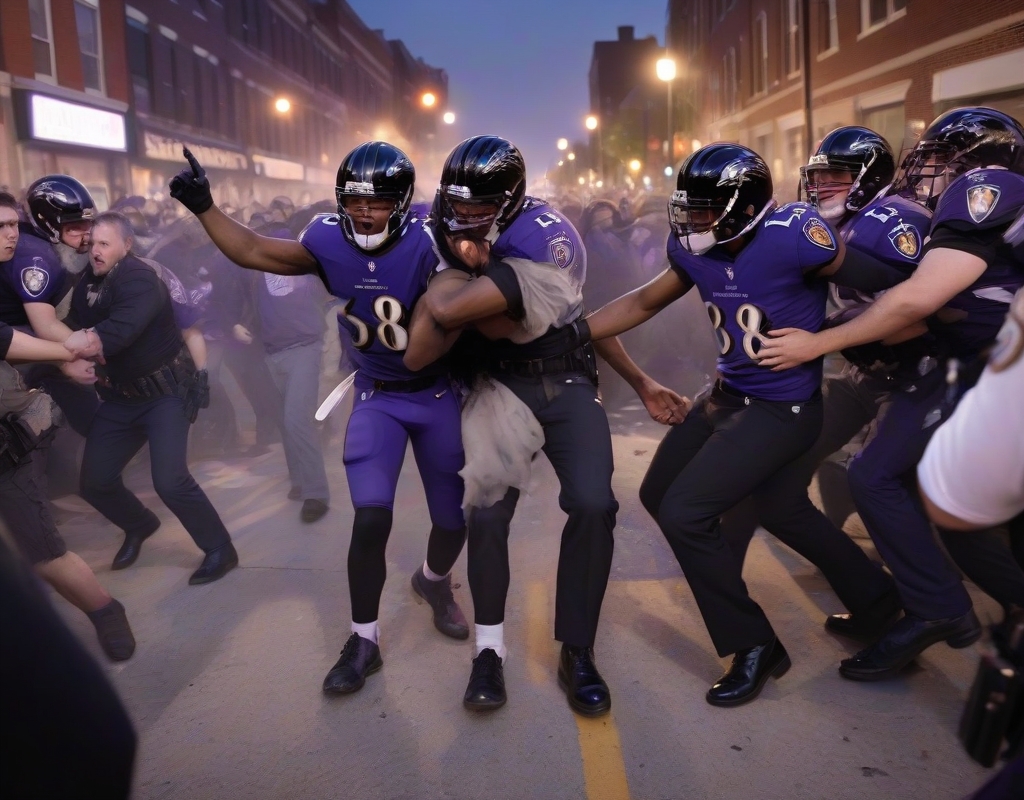In a distressing development that underscored the darker side of sports fandom, a Baltimore Ravens fan was taken into custody following a violent encounter that left two Washington Commanders supporters severely injured. The incident, which unfolded on October 13 following a game between the two teams, resulted in rapidly circulating video evidence of the assault across various online platforms, eliciting public outcry and swift police involvement.
The altercation took place in the vicinity of South Charles Street, where 24-year-old John Callis, who was clad in a Lamar Jackson jersey, reportedly initiated an unprovoked attack on the Commanders fans. According to eyewitness accounts corroborated by police findings, Callis knocked one of the individuals unconscious while shoving another against a brick structure. A particularly disturbing element of the captured footage was Callis’s boastful proclamation, “I don’t lose!”—a statement that became bitterly ironic in light of his subsequent legal troubles.
In response to the video evidence, the Baltimore Police Department acted quickly, putting out an arrest mandate for Callis on multiple counts, including first-degree aggravated assault and three counts of second-degree assault. Given the severity of a first-degree assault charge in Maryland, which could impose a penalty of up to 25 years in prison, the incident demonstrates how seriously such violent acts are taken by legal systems, especially when amplified by digital dissemination.
By Monday following the incident, recognizing the closing net of law enforcement, Callis turned himself into the police. Appearing in custody, his appearance was starkly different from the bravado shown during the assault, now replaced by the reality of his dire situation as he faced significant charges for his actions.
This violent episode sparked significant dialogue concerning fan behavior and the security protocols at sporting events. Historical data, including findings from the National Center for Spectator Sports Safety and Security (NCS4), suggest that while high emotions at sports events can sometimes lead to volatile situations, the community and sports bodies are increasingly intolerant of such violent disruptions. Leaders and stakeholders in Baltimore and beyond used this incident to reiterate their commitment to fostering environments where fans can enjoy sports without fear of violence.
The Baltimore Ravens took a definitive stance against the violence, with team representatives publicly condemning the incident and affirming their dedication to maintaining a safe, welcoming space for all spectators. Mayor Brandon Scott echoed this sentiment, highlighting the need for enhanced security measures and community engagement to prevent such incidents.
From a legal perspective, the implications for Callis are severe. First-degree aggravated assault charges reflect societal condemnation of harmful physical attacks, meant to cause serious injury. The additional second-degree charges suggest Callis could be significantly penalized for his actions. Michael Glasner, a criminal defense attorney, noted, “The rigid penalties for such offenses as set out by Maryland law serve as a deterrent against the disturbing peace and a protection for community safety.”
But beyond the legal outcomes for Callis, the incident rings as a wake-up call for the broader sporting world regarding fan interactions. Dr. Lindsey Whitaker, a sports sociologist, advocates for educational initiatives that highlight the damaging impacts of fan violence, promoting sportsmanlike conduct: “Transforming our approach can enhance fan experiences and deescalate potential conflicts. We must marry fervent support with respectful competition,” asserted Whitaker.
In these reflections lies a broader societal challenge—to balance passion for sports with respect and civility. As the legal proceedings against John Callis unfold, this incident serves as a sobering reminder of the real-world impacts of undisciplined fan behavior. The sports community continues to hope that this unfortunate event can reinforce the positive spirit of sportsmanship, ensuring the safety and enjoyment of all those gathered to share in the momentous experiences provided by sports. This sober narrative not only highlights the consequences of fan violence but also encourages ongoing discussions about respect, tolerance, and shared joy in sports culture.




